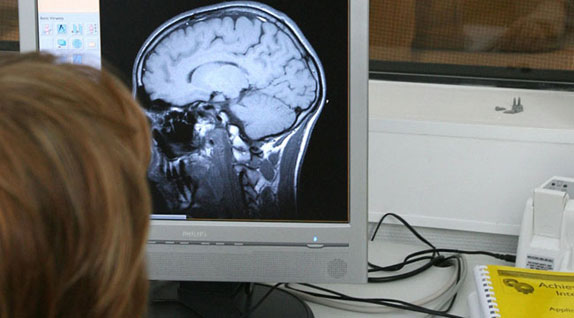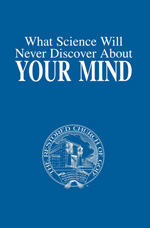 Valery Titeyevsky/AFP/Getty Images
Valery Titeyevsky/AFP/Getty Images
Article
Incredible advancement. Seemingly boundless knowledge. Spectacularly scaled building projects. Minute technological precision. Satellite communications. Marvels in engineering. Spacecraft hurtling through the solar system—all spawning from the genius of the human mind. But what is missing?
Learn the why behind the headlines.
Subscribe to the Real Truth for FREE news and analysis.
Subscribe NowIn the countryside along the Franco-Swiss border, an international team of scientists works on the largest particle accelerator—a 17-mile ring buried beneath the Swiss Alps and Jura Mountains that can hurl particles at 99.9% of the speed of light.
 Getty Creative
Getty CreativeIn Palo Alto, California, Stanford University researchers continue to develop a breathable polymer-based artificial cornea, which, if successful, will remove the need for cornea transplants and help millions to see again.
In Dubai, United Arab Emirates, construction crews work endlessly on the Al Burj skyscraper, what is already the tallest manmade structure on earth and is slated for completion in 2009.
In Utah, on the Bonneville Salt Flats, there is the first unmanned, tethered flight of a prototype spacecraft that is aiming to bring space travel for the first time to the public.
In London, England…
In Beijing…
Across every continent, advancements in technology, engineering, architecture and science can be seen—bringing forth incredible results. And it appears whatever man sets his mind to do, given sufficient time, funds and resources, can—and will—come to pass.
Incredible Advancement…
More detail about a few of the above examples serves well to understand the mind of man.
The scientists working on the world’s largest physics experiment, the Large Hadron Collider, hope to uncover some of the most vexing mysteries of the universe. By accelerating two separate streams of particles in the 17-mile-long vacuum tubes and allowing them to intersect and collide on their near-speed-of-light journey, the researchers can create what is termed “big bang”-like conditions. This research is hoped to shed light on the origins of mass, the properties of dark matter, find unseen symmetries in the universe, and perhaps even extra dimensions in space.
Despite not being completed, Dubai’s Al Burj skyscraper already substantially dominates the Dubai skyline. Upon completion, the tip of the building’s spire will be seen up to 65 miles away. While the final height of the building remains a secret, companies involved with the project have said it will be over one kilometer tall!
With these and other current projects, one can see the genius of the human mind in full splendor.
What were once only plot points in the minds of science fiction writers are quickly moving into the realm of possibility. Advancements in the engines needed for fully-functioning flying automobiles are manufactured each year. Several different materials have been created that can bend light around an object, making invisibility cloaks possible. Even moon colonies are being planned. Scientists are looking to the possibility of creating force fields to shield astronauts from space radiation. After moon colonies, man hopes to colonize Mars.
Robots with artificial intelligence, floating manmade island cities, the infinite applications of nanotechnology—these are all coming within reach.
…Appalling Evils
However, there is a flip side to man’s ability. This article could have taken a drastically different tone.
In Mexico City, Mexico, drug cartel members unabashedly kill police officers in retaliation against a government that has vowed to put an end to their illegal activities.
In the Middle East, terrorists regularly run into crowded areas and blow themselves to pieces.
In Africa, millions are starving due to drought and famine.
In the U.S., cities are inundated with water, unable to protect themselves from hurricane storms.
In the Darfur region of Sudan…
In Russia…
As the marvels and advancements of knowledge and technology mushroom, mankind’s problems continue to worsen.
These two extremes lay bare the paradox of the human mind: It can produce things that can stun and even take one’s breath away, but exacerbates the same problems. Why this disconnect? It appears something is missing. Everyone seems to desire peace, wants disease eradicated, longs for these problems to be solved. But to no avail.
Stubbornly, scientists, philosophers, educators, government leaders, etc., attempt to devise possible answers. But the greatest problems never cease. What is missing? Where else is there to turn?
Animal vs. Human
To better understand this apparent paradox of the human mind, we must step back and make a few comparisons between animals and humans. This will, in turn, lead to the answer—the key ingredient missing—of why man appears unable to solve his problems.
Typically, man is regarded as the pinnacle of the animal kingdom. His mind is viewed in the same light. While his brain is only slightly more complex, man’s output far surpasses anything ever produced from an animal.
It is not the purpose of this article to get into the complex science behind brain research. Simply put, mammalian brains are similar to that of humans. But the human brain is the most complex, followed closely by the dolphin and chimpanzee. However, neuroscience has yet to lock down why the human brain can produce distinctly human traits. Some regard the human mind as the final frontier.
The differences between the capabilities of the brains of animals and the mind of man can be addressed from a different angle than looking at brain mass, how many neurons are firing, the number of synapses connecting tissue or an increase in processing power. Instead, there are traits distinctly human, which show the incredible complexity and variety that can be produced from the mind of man.
Humans laugh. They smile. They find situations humorous, whereas no animal does this. Let’s say you are playing with a kitten and a piece of string. You may find the situation entertaining and be smiling and laughing, but the kitten is practicing to hunt.
The human mind can spend decades perfecting the design of musical instruments and then build each instrument for an orchestra. It can use that mind to compose a symphony and create a way so that each musician can replicate the sounds the composer intended, even hundreds of years later.
It gets even more fascinating. The human mind can then appreciate the music being performed and find beauty in it. And beyond this, it can argue the nuances of this beauty. Long-winded conversations can be held over what different emotions are felt from Beethoven’s 9th symphony versus his late string quartets, and preferences can be made from these differing opinions. (All this without mentioning that the same music can be recorded, stored and played back today at a listener’s convenience.)
These activities may seem mundane. But look to any animal and it does nothing of the sort. How incredible is the human mind!
And yet there is more. The human mind is adaptable. It can both create and hone new technologies. Throughout history, cultures and civilizations have handed down technology with each generation. Knowledge is also passed down and increases with each new passing year.
However, humans also pass on history and traditions and culture, which continue to develop and change with each generation. Successes and mistakes are also passed on; one can look to the past and alter behaviors so that mistakes are not repeated, which is another difference between humans and animals.
And more, rather than performing on instinct alone, man is capable of changing his course of action, at any time, for whatever reason—even if he seemingly has “no” reason.
Often in philosophy, the question is asked, “Why does man exist?” This question generally goes unanswered. But merely the act of asking shows that man is different.
The list of differences between the output of the brains of man and animal could go on nearly indefinitely. However, the differences have yet to be explained by science.
But again, why, when man can produce such vast and varying degrees of marvels with such precision, can he not solve problems threatening his very existence?
Man’s Solutions: Do Not and Cannot Work
Man has tried everything, from capitalism to communism, from Nazism to Socialism. Left, right; up, down—and the problems remain. If implemented solutions appear to work, it is only for a short time and generally only complicates matters. History is a testament to this!
For example, in an attempt to fight and eradicate disease, antibiotics were created. For a while they worked wonders; infections could be controlled and cured. After small successes, many varying forms of the drugs were created. Antibiotics were prescribed for nearly every ailment, ear-infection, sinus trouble, STD, etc.
Fast-forward to the present. Old infections and bacteria are growing immune to even the strongest of drugs. Doctors must now battle “superbug” infections such as MRSA and C. diff that continue to grow increasingly resistant. With the passing of time, this answer created by the human mind will no longer be an option.
Many people equate the human-mind conundrum to humans being just that—human. That “this is how we operate, and will continue to.” They can see that problems such as war, disease, famine and overpopulation do not end. And despite the efforts of governments, aid organizations, think-tanks, scientists, religionists and philosophers, not one of the problems has been solved—ever.
Why this breakdown? Ask yourself, Does this make any sense whatsoever?
How can there be such an ability to learn, solve complex problems in engineering, technology, etc., but other problems linger?
Mind of Man
Philosophy and religion often work to answer “why mankind is”—what he is and his purpose on the earth. These two studies also look into why the human mind works as it does.
There are two main camps on why the human mind possesses such astonishing capabilities. Philosophers, scientists and religionists typically support these two theories above the rest. One argument is that man’s mind is entirely physical—merely more complex than other mammals; the other is that man has an immortal soul.
Does Man Have an Immortal Soul?
“But there is a spirit in man: and the inspiration of the Almighty gives them understanding” (Job 32:8).
Many read verses like this and conclude that it is speaking about immortal souls. But is it? Is the phrase “spirit in man” synonymous with an “immortal soul” composed of spirit?
Most people do not understand the relationship between physical men and souls. They assume that human beings are born with immortal souls. The popular belief is that, upon death, the souls of sinners go to hell forever and those of the just go to heaven forever, since all souls are supposedly immortal. Is this what the Bible teaches?
Romans 6:23 states that “the wages of sin is death,” not life in hell. So, does the Bible somehow also teach that people have immortal souls? It does talk about “souls,” but in what context?
The Bible does teach that there is a connection between men and souls. Genesis 2:7 states, “And the Lord God formed man of the dust of the ground, and breathed into his nostrils the breath of life; and man became a living soul.”
This verse does not say that men have souls, but that they are souls. Adam became a soul—he was not given one. Then, almost immediately, God warned him, “And the Lord God commanded the man, saying, Of every tree of the garden you may freely eat: but of the tree of the knowledge of good and evil, you shall not eat of it: for in the day that you eat thereof you [not just your body] shall surely die” (vs. 16-17). When placed together, these three verses reveal that men are souls and that souls can die!
The prophet Ezekiel confirms the book of Genesis. Twice he was inspired to write, “The soul that sins, it shall die” (18:4, 20). Death is the absence of life. It is the discontinuance—the cessation—of life. Death is not life in another place. It is not leaving “this life” for “another life”—the “next life.”
Finally, on the subject of whether the soul can die, notice this in Matthew 10:28: “And fear not them which kill the body, but are not able to kill the soul: but rather fear Him [God] which is able to destroy both soul and body in hell.”
The Bible says that souls can be destroyed! According to this verse, they can be destroyed as much as bodies can. We all recognize that bodies eventually die and that, afterward, they naturally decompose and are completely “destroyed” due to the process of natural corruption. This verse explains that God does the destroying of souls in hell! Bodies can die in many ways. But souls are destroyed in hell by God.
To learn more about the spirit in man, as well as other points in this article, read What Science Will Never Discover About Your Mind.
One side relies entirely on the physical realm of science, what can be learned from the five senses of sight, taste, hearing, smell and touch. The other side opens the door to a spiritual realm, where man is more intelligent because of an immortal soul, which, according to the argument, animals do not have.
If you take the completely physical side, one would have to conclude that man could never solve his problems. He never has even remotely come close in the past, and, after many thousands of years of trying, why should he believe he suddenly will? If this is the answer, then these problems are merely distinctly human traits, and humanity will have to continue to work around them as long as he can sustain his existence.
The opposing party purports that each human has an immortal soul, setting him apart from the animal. Can this side be proven?
As this theory is generally brought forward by Christianity, the most logical place to look for the answer is the Bible.
The beginnings of an answer come from the book of Job: “But there is a spirit in man: and the inspiration of the Almighty gives them understanding” (Job 32:8).
Many jump on this scripture as a “proof-text” for their argument of the immortal soul belief. Yet, this is simply not the case. Man IS a “soul.” He does not have a soul (see inset). The idea that each human has an immortal soul is not supported by the Bible.
If neither of the most popular ideas can be proven, where else can one turn for an answer? Something is setting apart animal and beast—but what? And why do problems remain unsolved, despite the best minds being solely focused on solving them?
The beginnings of an answer come from the same passage in Job: the “spirit in man.”
A Missing Element
The New Testament also reveals more about this spirit in man, “For what man knows the things of a man save the spirit of man which is in him?” (I Cor. 2:11).
The human brain is capable of higher thought because of the “spirit of man which is in him.” It could also be said that this spirit of man, working with the human brain, enables man to function on the plain of higher thought.
The same passage in I Corinthians concludes, “Even so the things of God knows no man, but the Spirit of God” (I Cor. 2:11).
An animal cannot gain physical knowledge because it does not have the spirit of man. Likewise, man cannot accrue spiritual knowledge without an additional element—God’s Spirit.
This verse introduces two types of knowledge, physical and spiritual. And mankind cannot know spiritual knowledge unless it is given him through the Spirit of God. He is able to know “the things of man,” and can accrue physical knowledge—what can be learned through the five senses. But he cannot obtain spiritual knowledge.
The world peace ever-sought cannot be found through the ideas of men. Notice: “The way of peace they know not; and there is no judgment in their goings: they have made them crooked paths: whosoever goes therein shall not know peace” (Isa. 59:8).
Putting these verses together explains the paradox of the mind of man. While there can be stunning achievements—awesome advancement—mankind’s problems only grow worse.
As long as humanity looks to government ideals, think-tanks, philosophers and the religions of men, it cannot break free from its problems.
The reason man cannot solve his most pressing problems—war, disease, famine, murder—is because they are spiritual problems, meaning they need spiritual solutions.
This spiritual knowledge is found solely through the Bible. The knowledge is unlocked only when a person has the Spirit of God—which gives understanding—working alongside or in the mind of someone whose mind God has opened (John 6:44).
Each article produced by The Real Truth brings the answers to the spiritual problems of man. If you wish to continue to learn more about the only lasting solutions to man’s problems, continue to read the articles published online throughout each month.



